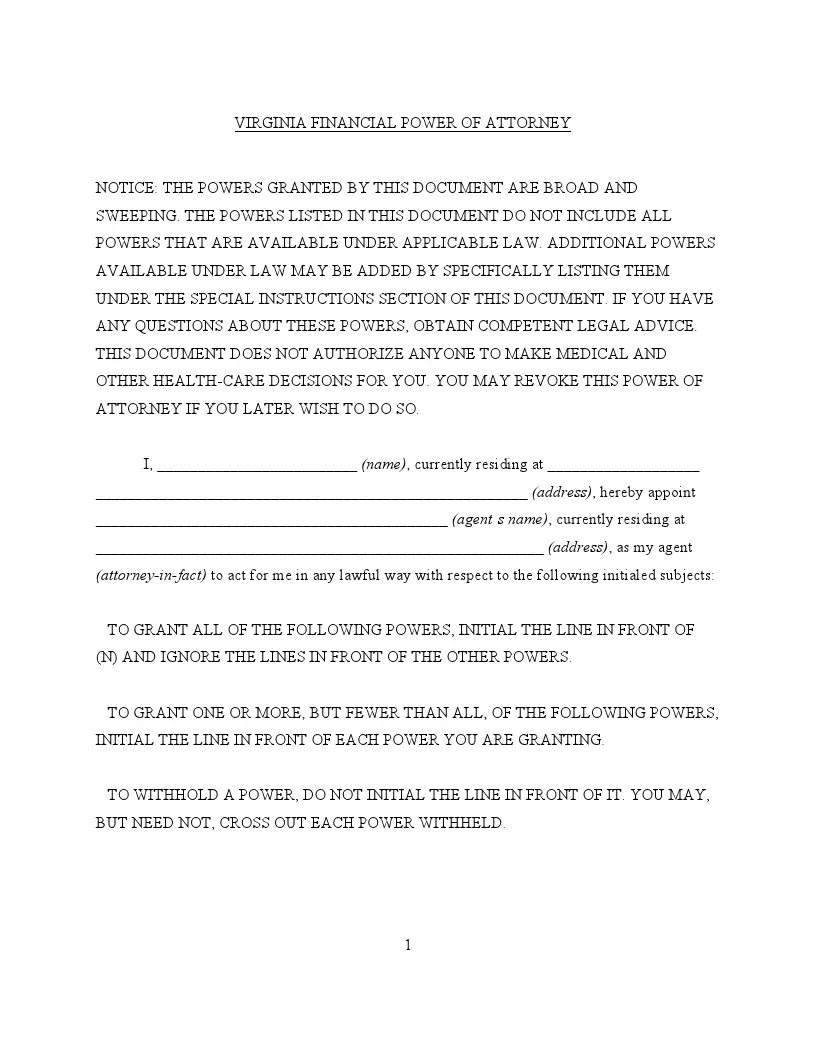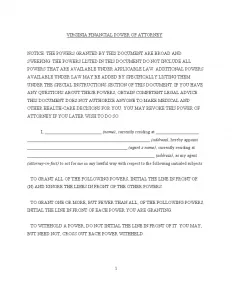Virginia General Financial Power of Attorney Form
The Virginia general financial power of attorney is a legal form that allows an individual (the principal) to designate another person (the agent or attorney-in-fact) to manage their financial affairs. This form gives the agent broad powers to handle banking, real estate transactions, personal property management, and business operations. However, the agent’s authority ceases automatically should the principal lose capacity.
In Virginia, this document must comply with state laws, particularly the Uniform Power of Attorney Act. The power of attorney form must be signed by the principal and notarized to be legally valid. The principal can also specify which powers are granted to the agent.
It should be noted that this document does not allow you to make health care decisions, so you will need to use other Virginia power of attorney forms for such cases.

Build Your Document
Answer a few simple questions to make your document in minutes
Save and Print
Save progress and finish on any device, download and print anytime
Sign and Use
Your valid, lawyer-approved document is ready
The Code of Virginia governs this jurisdiction’s general power of attorney (Sections 64.2-1600 to 64.2-1642), providing a structured framework for granting authority. When someone appoints an agent through such a document, the agent must adhere to specific duties to manage the principal’s affairs responsibly and ethically. Key responsibilities of an agent include:
- Acting in the principal’s best interest and according to their known expectations.
- Maintaining good faith and integrity within the granted authority.
- Avoiding conflicts of interest to remain impartial.
Additionally, agents must perform their duties with the appropriate level of care and skill that would be expected under similar circumstances. They must also maintain comprehensive records of all transactions and financial activities. Agents should collaborate with those making healthcare decisions for the principal if needed.
Virginia General Power of Attorney Form Details
| Document Name | Virginia General Power of Attorney Form |
| Other Name | Virginia Financial Power of Attorney |
| Relevant Laws | Code of Virginia, Sections 64.2-1600 to 64.2-1642 |
| Avg. Time to Fill Out | 10 minutes |
| # of Fillable Fields | 41 |
| Available Formats | Adobe PDF |
Filling Out Virginia General (Financial) POA Form
Creating a general financial power of attorney in Virginia allows you to appoint someone to manage your financial matters. This document grants broad powers, so you must carefully complete each section to ensure it reflects your wishes accurately.
1. Start with Your Information
Enter your full name and address in the designated spaces. This identifies you as the principal — the person granting the power of attorney.
2. Appoint Your Agent
Next, fill in the name and address of the person you appoint as your agent, also known as your attorney-in-fact. This individual will have the authority to manage your financial affairs. Make sure to choose someone you trust implicitly.
3. Define the Powers Granted
You will see a list of powers from (A) to (N), each corresponding to different areas of authority like real estate transactions, banking activities, etc. You must initial next to each power you wish to grant. If you wish to grant all listed powers, initial next to (N) and ignore the rest. If you choose not to grant a specific power, do not initial next to it.
4. Add Special Instructions
If you want to apply specific conditions or limitations to the powers granted, write these in the provided field.
5. Set the Effective Date
Decide when the powers will become effective. You can choose for the power of attorney to take effect immediately or start on a future date. Initial next to your choice to confirm.
6. Determine the Termination Date
Specify when the power of attorney will end. You can set a specific date, stipulate it ends upon your incapacitation, or when you sign a written revocation. Again, initial next to your selection.
7. Successor Agent
If the initial agent is unable or unwilling to serve, you may appoint a successor agent by entering their name and address. This ensures that someone can always act on your behalf without interruption.
8. Sign and Date the Form
Sign and date the form after reviewing all the information and ensuring it accurately reflects your intentions. Your signature must be witnessed by two independent individuals or notarized to be legally binding.
9. Notarization
If you opt for notarization, bring the document to a notary public. The notary will verify your identity and witness your signature, officially sealing the document.
10. Finalize the Document
Once signed and notarized (or witnessed), your general financial power of attorney is complete. Keep the original safe and provide copies to your agent in Virginia and any financial institutions where they will need authority to act on your behalf.
